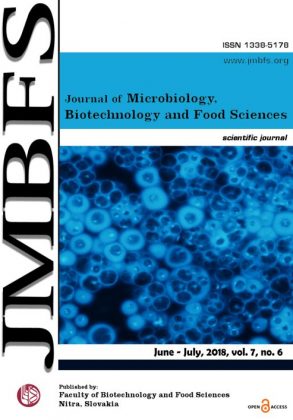THE EFFECT OF MICROSATELITTE CORE SEQUENCE IN THE DIFFERENTIATION OF AMARANTHUS CRUENTUS GENOTYPES
DOI:
https://doi.org/10.15414/jmbfs.2018.7.6.607-610Keywords:
Amaranthus cruentus L., dinucleotide microsatellites, ISSR, core sequenceAbstract
A collection of Amaranthus cruentus accessions was analysed to compare the characteristics of different dinucleotide core sequences of microsatellites repeats. ISSR analysis was performed to obtain corresponding genetic fingerprints and based on them, to construct dendrograms for every individual primer used in the study. A total of eighteen accesions were analysed. Dinucleotide sequence of (CA)6 repetition anchored by GG bases resulted in a total of 65 DNA fragments and 100-percent polymorphism. This marker has differ completely only 10 from all of the analysed genotypes. Dinucleotide sequence of (CT)8 repetition anchored by AC bases has resulted in the amplification of totally 97 fragments and 84.62 % of polymorphism. Only seven accesions were different among themselves when regarding this microsatellite core sequence. Dinucleotide sequence of (GA)6 repetition anchored by CC bases has resulted in the amplification of totally 171 DNA fragments and 100 % polymorphism. Not all the genotypes were separated based on this marker, two of them - Ames 5638 RRC 1139 and Ames 5648 RRC 1148 - possess the same profile of amplified ISSR fragments. The most distant genotype separated by all of the used primers was a landrace PI 511876 Huatle originated in Mexico.Downloads
Download data is not yet available.
Downloads
Published
2018-06-01
How to Cite
Kyseľ, M., Å tefúnová, V., Bežo, M., & Žiarovská, J. (2018). THE EFFECT OF MICROSATELITTE CORE SEQUENCE IN THE DIFFERENTIATION OF AMARANTHUS CRUENTUS GENOTYPES. Journal of Microbiology, Biotechnology and Food Sciences, 7(6), 607–610. https://doi.org/10.15414/jmbfs.2018.7.6.607-610
Issue
Section
Biotechnology
License
Copyright (c) 2018 Matúš Kyseľ, Veronika Štefúnová, Milan Bežo, Jana Žiarovská

This work is licensed under a Creative Commons Attribution 4.0 International License.
All papers published in the Journal of Microbiology, Biotechnology and Food Sciences are published under a CC-BY licence (CC-BY 4.0). Published materials can be shared (copy and redistribute the material in any medium or format) and adapted (remix, transform, and build upon the material for any purpose, even commercially) with specifying the author(s).





